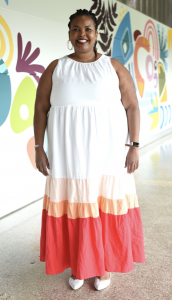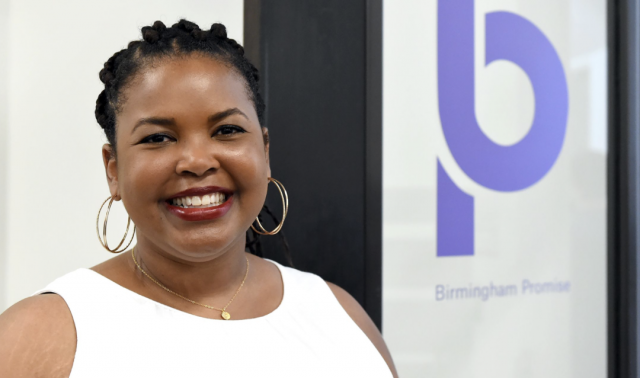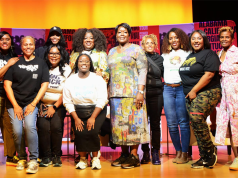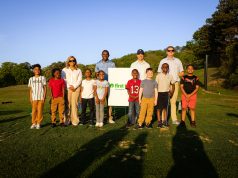By Ryan Michaels
The Birmingham Times
Samantha Williams knows a little something about what educational opportunities can mean in the life of a student – hers and others.
Williams grew up in a house her father Roy built in Montrose, Alabama, an unincorporated community in Baldwin County which lies along the eastern portion of Mobile Bay. Her family didn’t make a lot of money.
But that didn’t stop Williams, 37, from leaving Fairhope High School in Alabama for Georgetown University in Washington, D.C., on scholarships from the university and Fairhope’s Rotary Club, and later, a career in which she spent years in Johannesburg, South Africa and served as global director for an international education nonprofit.
But Williams, who left her post at Teach For All earlier this year, isn’t done yet.
Williams, who came back to the United States in 2017, has been executive director of Birmingham Promise, which provides scholarships and apprenticeships to city public school students, since March of this year and said she intends to help the program live up to its name.
“I want us to be talking to kids earlier and earlier, working as closely as possible with the Birmingham City Schools (BCS) system, so that this feels like it’s something that is just a guaranteed promise, real promise at the end,” Williams said.
At Georgetown, where she earned a bachelor’s degree in history, Williams said she first became interested in the field of education, through a work-study job in which she tutored public school students in D.C.
Some of the students, many from low-income families, simply “didn’t stand a chance” because of the quality of the school system, Williams recalled.
“That was really my beginning, when I was working in those schools, and tutoring kids who were too old to not be able to spell the things they couldn’t spell or read the things they couldn’t read, and you thought about how far behind they’d be for the rest of their lives because of this barrier,” Williams said.
During her time at Georgetown, Williams also studied in Dakar, Senegal, where she became interested internationally in education.
A graduate of Georgetown University, Williams also has a master’s degree in development studies from the University of the Witwatersrand in Johannesburg, and a master’s degree in education from Harvard University.
After finishing her degree in history at the university in 2006, Williams worked in dropout prevention in Atlanta, Georgia before receiving an ambassadorial scholarship from the Fairhope, AL Rotary Club in 2008, enabling her to study at the University of the Witwatersrand in Johannesburg.
“That was supposed to last for one year…[I] moved to South Africa to study education and social development in Johannesburg, and kind of just stayed in South Africa for almost the next decade,” Williams said.
She also worked at the Oprah Winfrey Leadership Academy for Girls in South Africa and through her travels saw areas for improvement in the education system.
“I saw how some of the schools there were failing the children. I knew that if that remained the situation, then unemployment and crime were not going away,” Williams told the Mobile Press-Register in 2010.
Oprah
Through her work with the school, Williams said she also met Winfrey and spoke with her many times.
“She came to the school pretty often…When I was there, she would come for all the graduations, she would come for workshops, so she was just very present,” Williams said.
The first time the two met, Williams said Winfrey had stopped by for the beginning of the school year and encouraged Williams in her work with the girls.
“I was in the office, looking over the list of the girls. It had all their names and their faces, and I was just trying to learn as many names as possible, and [Winfrey] just walked up to me and put her hand on my shoulder and said, ‘You’re gonna do great, you’ll learn all of them soon enough, and you’re gonna be great,’” Williams recalled.
Having “adored” Winfrey through her college years, Williams said it was the “weirdest thing” going back to her apartment to watch Winfrey’s show after their first meeting.
Williams’ nicest memory of Winfrey was when the TV star complimented her outfit, a long, multicolored satiny gown made in South Africa, at an event one night.
“I said like, ‘Oh my goodness, like, that’s a huge compliment coming from you,’ and [Winfrey] said, ‘Well, it’s a beautiful dress’ and just sort of kept moving, and I was like, ‘Oh my goodness gracious.’ Oprah complimented this dress. I’m never taking it off,” Williams said.
Winfrey remained an encouraging figure throughout the time that Williams knew her, she said.
“She just made it a point to remember things about my life and what I was going through,” Williams said. “It was unreal to have such a woman take an interest in you, you know?”
While working in Africa, Williams said she became deeply embedded in her community, which enabled her to be effective in her education work. However, that “undeniable tie” could be stronger in the U.S., she said.
“I was able to do that work in Africa for nearly a decade because I was there, I was proximate, deeply rooted, and yet I still knew that I would be even more effective in the US and in particular in the South,” Williams said.
Williams began working with Teach For All in 2012, while still in South Africa, and worked her way up to become head of the Africa region in 2016. That same year, her father died, another thing which spurred her return to America.
“I realized that I didn’t have all the time in the world with my family, or to do something about the conditions that I was so familiar with at home. I just decided some places need leadership in order to make a difference, and maybe it’s time for me to move on from training and supporting other leaders, to step into that role myself,” Williams said.
After serving as head of the Africa region at Teach For All for about a year, Williams moved back to the United States in 2017 to become chief of staff to CEO Wendy Kopp before becoming global director for girls’ education in 2019.
In March of this year, Williams was named the new executive director of Birmingham Promise, and after heading the organization for about half a year, Williams said she wants to grow what the program offers and better tailor those to students’ needs and get rid of thinking that separates “college-bound kids” and everybody else.
“[People should think,] ‘Here are all my kids who are going to turn into adults who need to figure out how to live for themselves and support themselves, and contribute to their communities and their families,’” she added.

The Magic City
Since taking on the role, Williams said she’s felt good about living and working in Birmingham, good enough that she just bought a home in the North Crestwood neighborhood, where she lives with her youngest sister Marilyn, a teacher at the Altamont School in the Redmont Park neighborhood.
“My first weekend here, my sister and I went to Vulcan and just sort of looked out at the city, like, ‘Oh we live here now. It’s kind of awesome,’ and I think it’s sort of felt like that sense. I really like Birmingham,” Williams said.
Also since being here, Williams said she’s rapidly made strong friendships.
“One of my friends here helped my sister get into a medical program that she needed to get into. I have folks who are in my life in ways that I haven’t made these kinds of friends since I was like in the college, grad school friend-making zone,” Williams said.
Back in her home state, Williams has also focused on her family. Growing up in rural Alabama, she and her family — father Roy, mother Ruth, as well as her sisters Marilyn, Sophia and Stephanie — have always been tight knit.
Williams, the oldest of the daughters, said she and her sisters were “pretty self-sufficient kids” growing up.
“I probably legally shouldn’t say at what age we started hanging out at the house alone, but as the oldest, I was in charge of the youngest. My dad would get home around like three o’clock in the afternoon from work, and mom got home at five. We were very close and insular as a family,” Williams said.
However, being the oldest, Williams said people didn’t give her as much as her sisters.
“As the oldest, I got less than they did because they’re the cute little sisters. The oldest child is like the guinea pig, and then by the time the youngest child comes around, they don’t think there are any problems at all. They were like, ‘Oh, we’re not poor,’ and it’s like, ‘No, you’re not poor. We were, but you’re not,’” Williams said.
While growing up, though, Williams said her parents worked hard for her and her sisters and that others in their community pitched in as well.
“People provided a lot of support to our family because they knew we’re a family of six, and my parents were trying very hard to give us whatever they could, so folks wanted to help that along,” Williams said.
That same kind of support she now provides for students in Birmingham City Schools.
Birmingham Promise provides up to four years of tuition assistance for graduates of Birmingham City Schools who attend public colleges and universities in Alabama. It also manages an internship program that allows high school seniors to build valuable work experience while earning money and gaining academic credit.
For more information on Birmingham Promise, visit http://www.birminghampromise.org/.





